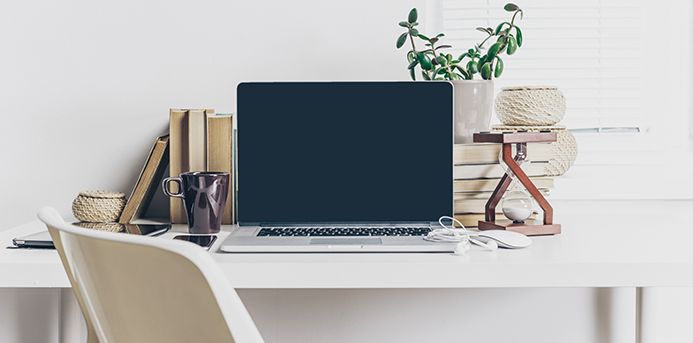The National Association of Professional Organizers reports we spend one year of our lives looking for lost items, and according to a study originally published in the Boston Globe, 21 percent of Americans have missed vital work deadlines due to clutter. So many of us fall victim to a messy or unsystematic workspace.
“It’s hard to concentrate when there is visual disarray,” explains Linda Goldman, professional organizer and owner of Altogether Organized. “A clean desk promotes a feeling of peace and calm which then makes it easier to concentrate.”
When your desk is organized, you can immediately find what you need without losing time searching for whatever it is you’re looking for. These tips will help you streamline your workspace so you can be more efficient.
Get Rid of the Items You’re Not Using
“Workspaces tend to collect stuff,” says professional organizer and owner of Clear Your Space East Sandra Schustack, who has worked with countless clients and even celebrities who are prone to constant clutter. “The first step is to do a purge to keep the mess at bay. Toss or shred old papers, cards and post-it notes, recycle dated technology, remove decorative items that are just collecting dust and donate furniture you don’t use.”
Make a Home for Your Things
“When you know where items live, it’s easier to find them and put them away,” explains Schustack. First, group similar objects together in piles to see what you have and determine where everything should go. Store office supplies together in a supply closet, drawer or on a shelf. Daily supplies should be in sight and close at hand. Keep essentials like pens/pencils, stapler and paper clips neatly in a desk drawer or contained on your desk/shelf. Drawer organizers keep everything in place, while bins or baskets are perfect for holding larger items. Put like-minded things together. For instance, printing paper and ink should be close to the printer for quick refills, and envelopes should be grouped with stamps.
Categorize Papers
Many of us are guilty of having piles or bags of papers that sit and accumulate. Goldman suggests using vertical file folders or a binder to hold papers. There should be a designated place for every category of papers such as insurance documents, activity schedules and urgent paperwork. Label each of these folders so it’s easy to find what you’re looking for when you need it. Colored folders can give visual cues to help you grab what you need in seconds. All files and reference materials should be stored in a filing cabinet or shelf. Schustack likes using a narrow desktop filing system to keep your most active files easily accessible.
Keep Your Computer Organized
Your computer is a main component of your workspace and it too can become disorganized. Keep your email inbox up-to-date. “As soon as a document lands on your screen, label it and store it accordingly. Cluttered screens stifle productivity,” says Schustack.
Choose the Right Lighting
Many studies have shown that regular exposure to natural light helps people sleep better and come to work better rested, thus improving their work efficiency. Artificial lighting that is too fluorescent or too dim can affect your focus. Choose natural light bulbs, keep window shades and doors open and add a desk lamp.
Designate Time to Clean Your Space
Goldman suggests carving out a chunk of time each week to tackle desk work. Likewise, Schustack advises her clients to clean their desks at the end of each week. Remove desktop contents, wipe down the area and put the items back where they belong. Schustack does not recommend filing individual papers as they come into your office. Designate a time at the end of each day or week to file your papers away. Your desk will feel clean, organized and ready to start another work week.

